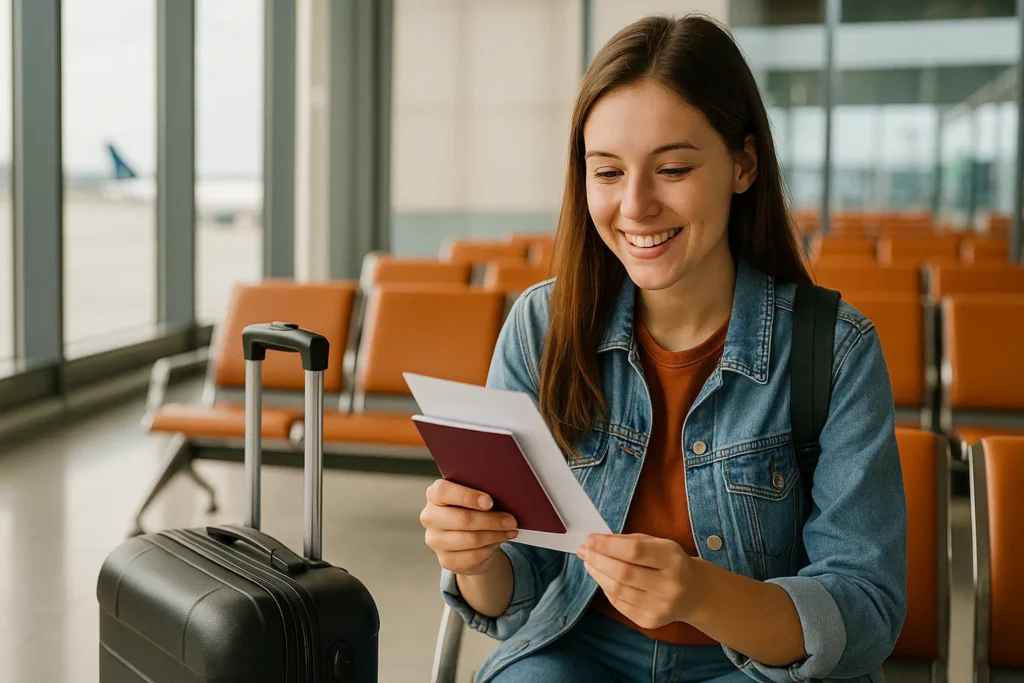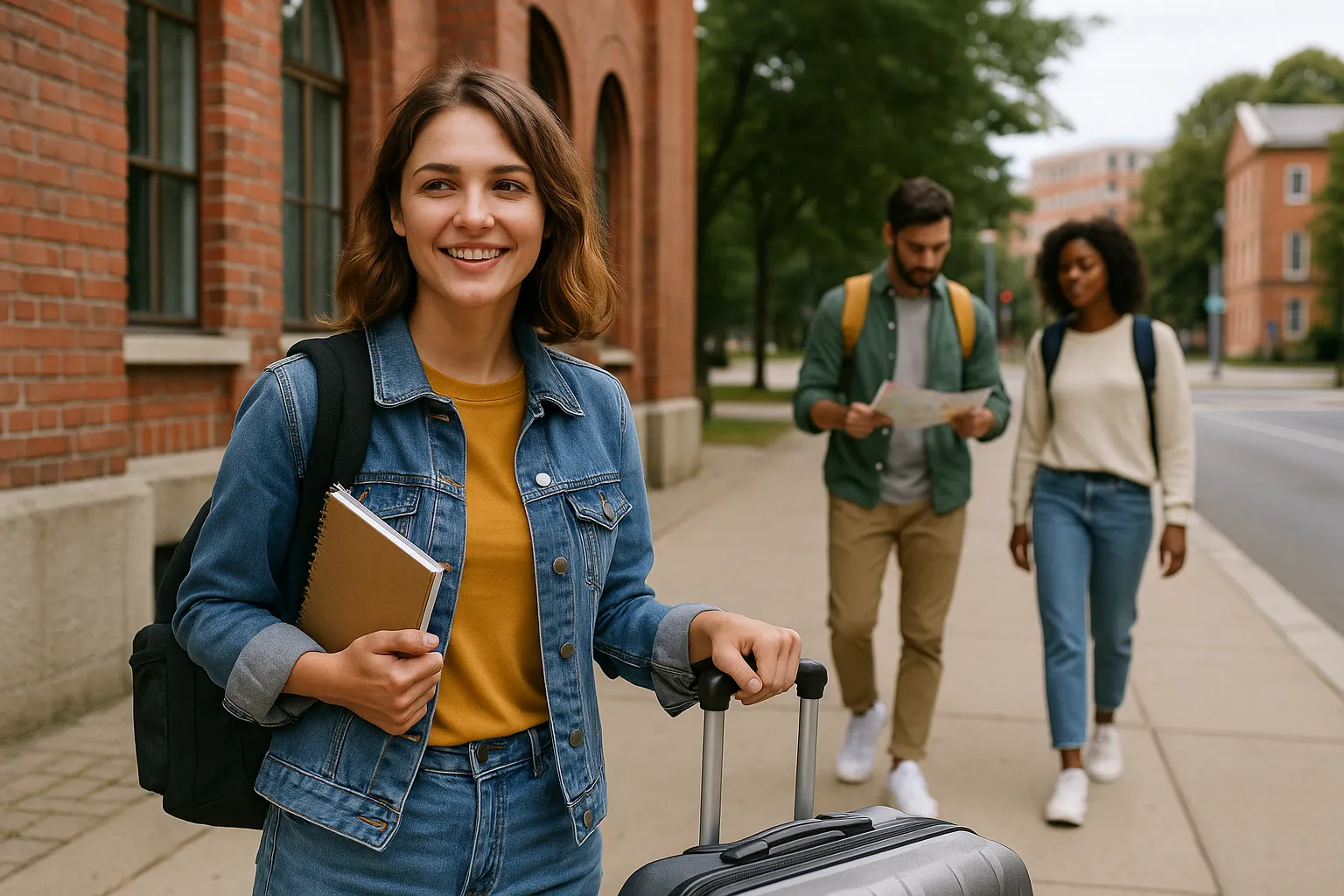Planning to study overseas brings excitement and worry about students’ safety abroad in unfamiliar places. You’re not wrong to feel these concerns.
Our team has found that students who prepare thoroughly feel more confident and stay safer throughout their entire trip. The guide shows you exactly how to prepare for a secure and healthy study abroad experience.
We’ll cover:
- Health preparations and medical planning that protect you
- How travel insurance works
- Personal safety planning for peace of mind
- Local laws and travel advisories you must check before departure
- Daily safety habits
- Building support networks
We’ve helped dozens of students from Australia study safely using similar methods. Students who follow our advice report feeling prepared instead of overwhelmed when they arrive.
Read on to learn how safety becomes your foundation for an amazing study abroad experience.
Health Preparations Every Student Needs for Safety Abroad
Your health becomes your travel anchor in any country around the world. Medical check-ups, medication planning, and health record organisation separate prepared students from those learning the hard way.
Medical Check-ups Need Two Months Lead Time
It is very important that you schedule your appointments with your GP in advance. The reason is that many countries require specific vaccinations that need time to become effective. Adding to that fact, popular clinics in Australia fill up quickly during peak travel seasons.
In the case of studying abroad, your doctor will review your destination and recommend necessary shots. Additionally, some vaccines need multiple doses spread over weeks.
You’ll also want to address any existing health issues before you travel overseas.
Prescription Medications: The Proper Packing Method
At least three months’ worth of any prescription medications you take regularly should come with you. From our experience, international students often struggle to refill medications in foreign countries due to different drug names and prescription requirements.
Remember that original bottles with clear labels work best for storing medications. Also, a letter from your doctor explaining what each medication treats proves helpful at customs. Another thing to bear in mind is that some countries have strict rules about bringing certain medications across borders. To avoid problems at customs, check your destination’s embassy website or contact the CDC’s travel health guidance for current medication restrictions before you travel.
Your Portable Health File Essentials
A health folder with copies of important medical records saves time during emergencies. The folder should include vaccination records, allergy information, and emergency contact details for your family back home. As a backup, digital copies in cloud storage work well too.
According to the CDC’s latest travel health guidance, proper health preparation helps students manage medical issues that may arise during international studies. Which means students with organised health records get faster, better care when problems arise.
Once your health foundation is solid, protecting it becomes the next priority with proper insurance coverage.
Travel Insurance That Protects Students

Travel insurance confusion leaves many students underprotected when they need help the most overseas. Proper coverage decisions change everything here. They protect international students from financial disasters that derail entire study programs.
Coverage areas you need to break down into these must-have categories:
- Student-Specific Policy Benefits: Basic tourist insurance excludes academic equipment theft, study program interruption, and extended medical needs that affect students. In contrast, student policies cover internships and field trips automatically.
- Medical Coverage Requirements: Countries like the USA charge $50,000 for serious medical emergencies without proper coverage. Therefore, emergency treatment, hospital stays, and medical evacuation back to Australia should be included in your policy.
- Personal Liability Protection: Accidental property damage or injury lawsuits can bankrupt students in countries with expensive legal systems. Fortunately, many policies include legal representation coverage for court proceedings, too.
- Policy Exclusions Review: High-risk activities, pre-existing medical conditions, and travel warnings can void your coverage completely. As a result, reading exclusions carefully prevents claim rejections when you need help most.
Insurance gives you peace of mind, while daily safety planning reduces the risks you’ll face.
Your Personal Safety Plan That Works

Winging it with safety sounds tempting when you’re excited about studying overseas, but small problems can turn into big headaches fast. A solid safety plan keeps you connected to home and ready for whatever comes your way.
Here are the safety plan elements that work best for students overseas:
- Emergency Contact Hierarchy: Three levels work best for student safety. Start with family back home, then add your university’s international office, and finally include local emergency services. Also, keep these numbers saved in your phone, and written copies as backup.
- Regular Check-in Schedule: Weekly calls suit most families, but daily messages work better during your first month abroad. In such cases, it’s best to pick specific times that work across time zones for consistent communication.
- Local Emergency Numbers: Police, medical, and fire service numbers differ in every country, so research these before arrival. After that, save the numbers in your phone with clear labels like “Local Police” for quick access.
- Hospital and Embassy Locations: Your nearest hospital and Australian embassy addresses should be written down with directions from your accommodation. These locations become vital during serious emergencies or document problems.
- Backup Communication Methods: Countries like China block WhatsApp, so download multiple messaging apps and test them with family before departure. As a backup plan, email provides a universal option that works everywhere.
Safety planning gives your family peace of mind and helps you feel prepared for your overseas adventure.
Travel Advisories and Local Laws You Must Check
Travel advisories and local laws catch many students off guard during their overseas studies. However, thorough research prevents legal troubles that can cost thousands in fines or even result in deportation from your study destination.
Key areas to research before you travel include:
- Government Travel Resources: Australia’s Smartraveller website provides detailed country profiles, safety warnings, and emergency contact information for every destination. What’s more, political situations change frequently, so check updates monthly for current conditions.
- Local Law Differences: Activities perfectly legal at home might carry heavy penalties abroad, like Singapore’s complete chewing gum ban. Similarly, Middle Eastern countries also restrict alcohol consumption and public displays of affection that Australians consider normal.
- Cultural Customs Research: Appropriate clothing, public behaviour standards, and religious practices vary dramatically between countries and require advance study. As a result, respectful behaviour reduces unwanted attention and helps you blend in naturally with locals.
- Embassy Registration Services: Australian citizens should contact their nearest embassy within the first week abroad to register their presence overseas. In addition, registration ensures you receive safety updates and assistance during natural disasters or political events.
Daily safety habits become your next priority once you understand local expectations and legal requirements.
Daily Safety Habits for Students Travelling Overseas

Transport security, accommodation checks, money protection, and street awareness form the core daily routines that keep students safe overseas. These four safety areas protect you from common dangers that catch many travellers off guard abroad.
Here are the daily safety practices that work best for students overseas:
- Transport Security Tips: Your passport, visa documents, and emergency cash should stay in a secure money belt under your clothing. Along with that, choose official transportation options like licensed taxis or university shuttle services over unmarked vehicles.
- Accommodation Safety Checks: Door and window locks need inspection to make sure they work properly on your first day at any new place. We recommend never share room keys, security codes, or entry procedures with casual acquaintances you have just met. Plus, valuable electronics, extra money, and important documents belong in locked storage or room safes.
- Money Protection Methods: Your cash should be split across multiple locations in your bags and clothing to limit losses if theft occurs. Furthermore, bank ATMs inside shopping centres or hotel lobbies offer more security than street machines in quiet areas. Before departure, contact your Australian bank to authorise international transactions and prevent card freezes.
- Street Awareness Habits: Good posture and purposeful walking help, even when you’re exploring new areas you don’t recognise. Also, keep one ear free when wearing headphones so you can hear approaching vehicles or people around you. Most importantly, listen to your gut feelings about people or situations that seem off or uncomfortable.
Safety habits become automatic with practice, so you will get the confidence to focus on your studies and enjoy your overseas experience.
Take Action on Your Study Abroad Safety Today
Safety preparation changes study abroad anxiety into excitement and confidence for your overseas adventure. The preparation steps ensure you arrive ready, stay safe, and make the most of your international education experience.
Your action checklist includes these steps:
- Health preparations two months before departure
- Travel insurance that covers student-specific activities and longer stays abroad
- Personal safety plan with emergency contacts and communication schedules with family
Drawing from our experience at Highlands Golfcourse, we’ve successfully guided hundreds of Australian students through safe study abroad preparation over ten years. Our knowledgeable team provides destination-specific advice and ongoing support throughout your international studies.
Contact our experienced team today to discover how we can help you prepare properly and study overseas with confidence.
